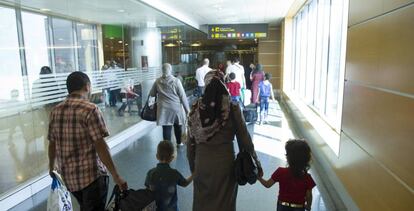Why Spain has only taken in half as many refugees as expected
Of the 586 people who were supposed to be here by late June, only 305 have landed on Spanish soil, according to the Interior Ministry

Refugees are arriving in Spain in a trickle. Of the 586 individuals who were going to be relocated or resettled “by late June” from camps in Italy, Greece, Turkey and Lebanon, only 305 have arrived.
The latest group, comprising six Syrian citizens, landed in Madrid last Thursday.
Interior Ministry sources said that “more will keep arriving throughout the summer.” The 305 refugees arrived on 12 flights between late May and end of June.
The ultimate goal is to turn the refugees into self-sufficient residents within a year
Despite early government plans to play a more prominent role in the refugee crisis, Spain ranks near the bottom of the list of European nations taking in asylum seekers. Hundreds of thousands of people are still waiting in camps around the Mediterranean, even as the Brexit vote has drawn attention away from their plight. Meanwhile, talks between the EU and Turkey to stem the refugee flow are stalled.
Most of the people who do arrive are families, as they have preference over single applicants. A delegation of Spanish government workers is in charge of handling the paperwork for approved individuals, who get fielded on site at camps and other refugee concentration areas.
While bureaucracy in the countries of origin is partly to blame for the delays in bringing refugees to Spain, the threat of terrorism is another factor. Police sources said that “it has been confirmed that some jihadists have returned using the refugee routes.” And the director of the new European Counter Terrorism Center, Colonel Manuel Navarrete, told this newspaper in early May that “there are counter-terrorism agents deployed in refugee areas.”
Sign up for our newsletter
EL PAÍS English Edition has launched a weekly newsletter. Sign up today to receive a selection of our best stories in your inbox every Saturday morning. For full details about how to subscribe, click here.
Once in Spain, refugees go through a six-month trial period, which in cases of extreme vulnerability can be extended to nine, according to José Javier Sánchez, deputy director for migrations at the Spanish Red Cross. The 305 refugees currently in Spain are scattered throughout the country – Madrid, Barcelona, Seville, Zaragoza, Bilbao – and are living in apartments run by aid organizations in cooperation with the Interior and Labor ministries.
During this trial period, refugees receive free room and board, legal advice, psychological support, Spanish lessons and schooling for children. Later comes a six-month “integration” period that includes subsidies to help with the rent and other basic needs. Spanish lessons continue throughout this time. The ultimate goal is to turn the refugees into self-sufficient residents within a year.
Sánchez said that Spain has the necessary resources to meet the goals set out by the government. “The Spanish people want to welcome the refugees and help with their integration, and that’s the most important thing of all,” he said. “The rest is logistics.”
English version by Susana Urra.
Tu suscripción se está usando en otro dispositivo
¿Quieres añadir otro usuario a tu suscripción?
Si continúas leyendo en este dispositivo, no se podrá leer en el otro.
FlechaTu suscripción se está usando en otro dispositivo y solo puedes acceder a EL PAÍS desde un dispositivo a la vez.
Si quieres compartir tu cuenta, cambia tu suscripción a la modalidad Premium, así podrás añadir otro usuario. Cada uno accederá con su propia cuenta de email, lo que os permitirá personalizar vuestra experiencia en EL PAÍS.
¿Tienes una suscripción de empresa? Accede aquí para contratar más cuentas.
En el caso de no saber quién está usando tu cuenta, te recomendamos cambiar tu contraseña aquí.
Si decides continuar compartiendo tu cuenta, este mensaje se mostrará en tu dispositivo y en el de la otra persona que está usando tu cuenta de forma indefinida, afectando a tu experiencia de lectura. Puedes consultar aquí los términos y condiciones de la suscripción digital.








































